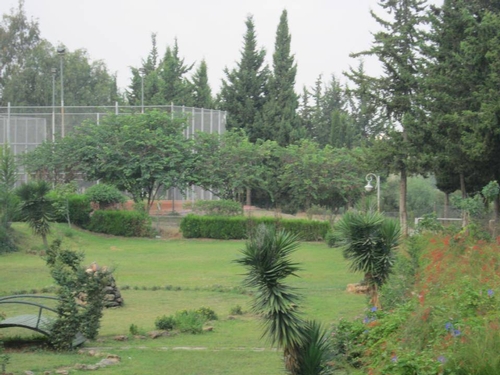Ventura County Farm Advisor Ben Faber is currently on sabbatical in Turkey. Today Ben shares a little about his studies.
Adana, Turkey is along the Mediterranean Sea, near the middle of the country, and is where I plan to spend the next 11 months studying and doing research. I am at Cukurova (pronounced Chuckorova) University which has collections of avocados, citrus, figs, mulberries and pomegranates. I came here because as a Mediterranean climate, it grows similar crops to California.
I had not realized that a Mediterranean climate could be so hot and humid, though. What defines a Mediterranean climate is one that has winter rain and summer drought and mild winter temperatures. The temperature at 6 AM in Adana is 37 C (98.6 F) and the humidity hovers around 75%. Most businesses do not have air conditioning, but they all have heaters. Most of the ‘Hass’ avocado trees do not look good, so I guess it is going to get cold this winter.
It is hot now, though, but that’s what makes the citrus grow, and grapes and figs and wheat and plums and apricots and corn and cotton that grow all around on the Cukurova Plain, once called the Cilician Plain.
The University is the largest agricultural school in the country with 45,000 students in diverse departments, such as horticulture, soils, and engineering, but also medical, dental, biotech, letters and sciences and other schools. The town of Adana has 1.5 million people, is about 20 miles from the coast, is at about the same latitude as San Francisco and has all the modern conveniences of any California town. Plus, it has a great bus system.
I am working with faculty from different departments on different trials. Two are on citrus; evaluating different rootstocks for iron deficiency and a chemical evaluation to control leaf flush in citrus. This latter trial is to reduce the new tissue that is so attractive to Asian Citrus Psyllid. In avocado, we are looking at different girdling times and styles for their impact on fruit set and yield. They have used a double girdling technique here on various tree crops for years and found that the double ring has effects that a single ring does not have.
Another trial is looking at different fig varieties as rootstocks, again to evaluate for resistance to iron deficiency. Figs world-wide are grown from cuttings, not grafted, because they root so easily. Having a rootstock that can handle the high pH soils that we have in coastal southern California could benefit a new industry in our State.
I am also working with the curators of the pomegranate and mulberry collections to better understand how those crops are grown here and also getting out meeting local growers of these crops.
The landscape here is fresh with new plantings, as far as the eye can see. It is really a dynamic agriculture with farms that look every bit as well cared for as those in California. Many of the local growers I have met have attended this University and several have studied in Europe and the US. My English gets me by, and when I get lost, people are good at steering me straight.
Adana is famous in Turkey for its kebab, a grilled, ground lamb that is served with lemon, onion, rice, flat bread, roasted peppers, mint, and salad. And everyone asks if I have eaten Adana kebab. Yes, I have, and it is wonderfully fresh food.

Cukurova plane (photo by Ben Faber)

Cukurova University Campus (photo by Ben Faber)